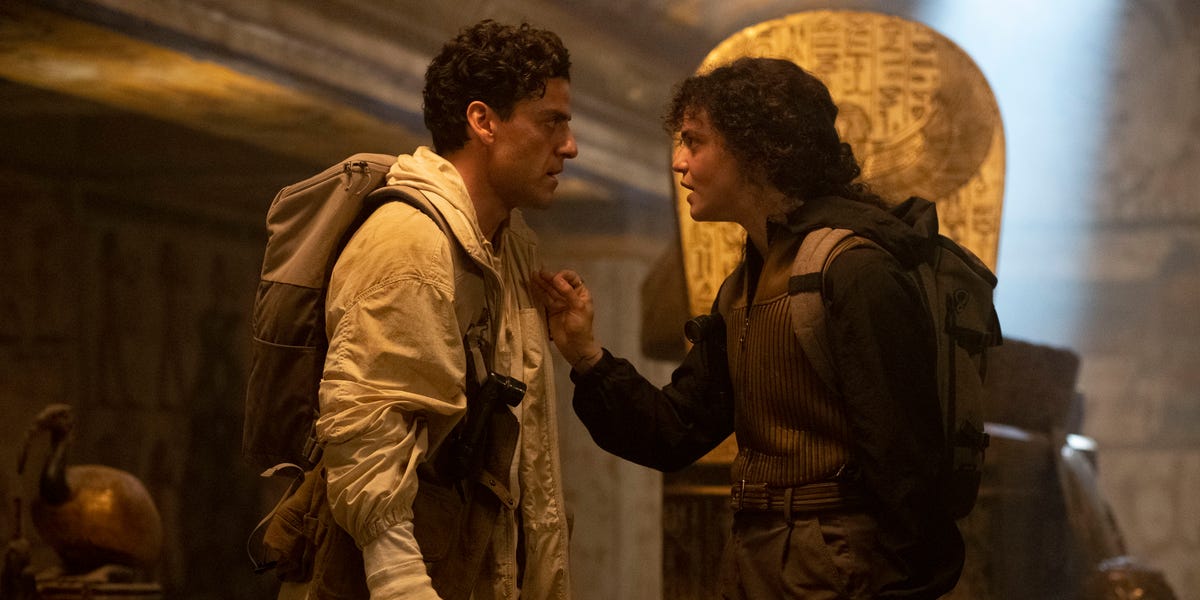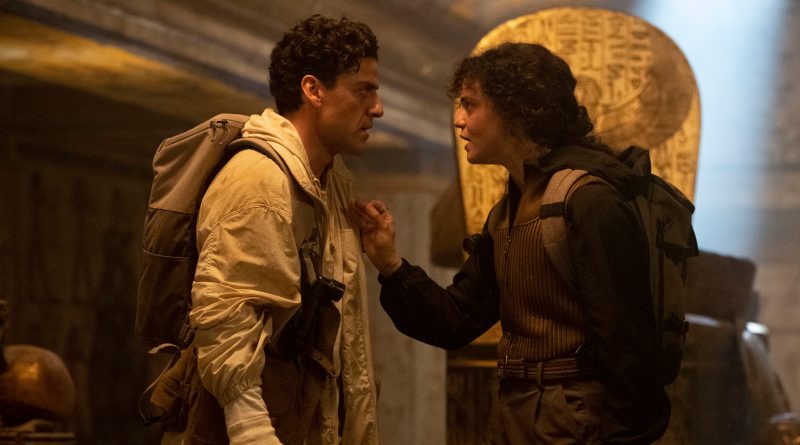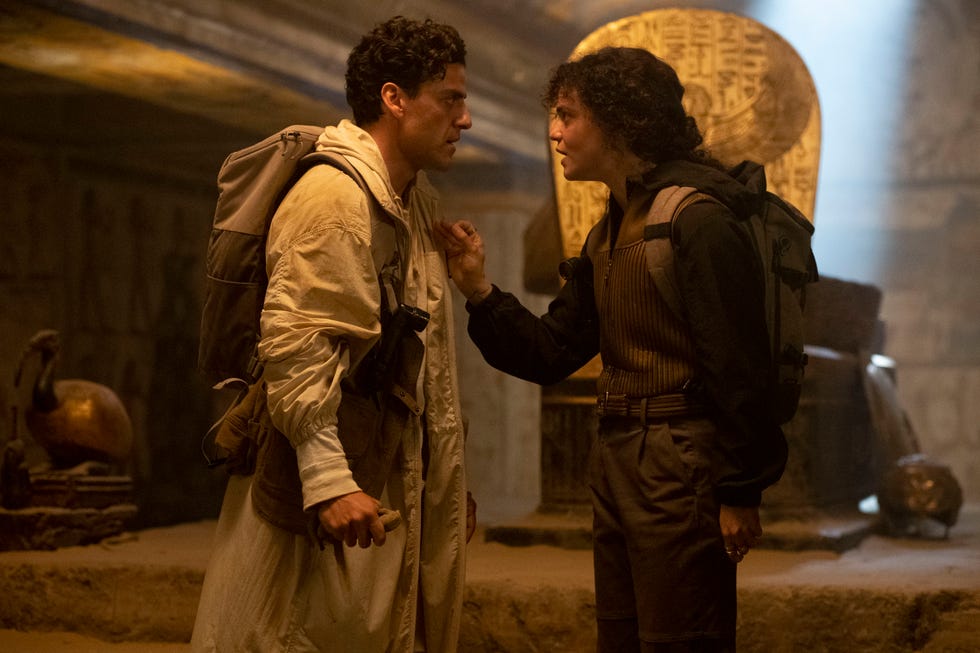The Moon Knight Finale Understood Its Mission

Neither Marc Spector nor Steven Grant was ever really “The Man Without Love.” That’s the essence of the Moon Knight finale, which wrapped up its six-episode arc with an ambiguous ending, and—as is to be expected in a Marvel production—a few cliffhanger reveals. But the reason why the show worked on any level, even with the frothing franchise machine nipping at its heels, was thanks to Marc and Steven’s emotional push-and-pull, executed with alacrity by Oscar Isaac, an actor who peels back new layers of his range every time he appears on screen.
As the dual personalities of Marc and Steven inhabiting the same body—a human avatar forced to relay the vengeance of the Egyptian god Khonshu—Isaac not only invented separate mannerisms and accents, but clearly dreams and desires and affections. For instance, both characters pine for Layla El-Fahouly (May Calamawy), Marc’s wife, but in a distinctly unique way. There’s no question that the season finale is far from the best episode of Moon Knight, but it does do an excellent job of smoothing the edges around Marc and Steven’s dissonance while retaining their singularity as characters. Episode 1 positioned Steven as the lonely “Man Without Love,” implying Marc as the same. In reality, they always had someone watching out for them; they only needed time to realize it.
Episode 6, “Moon Knight,” opens with Marc/Steven’s body floating in the waters of the tomb, his bullet wounds seeping red into the water. (You’ll recall Ethan Hawke’s Harrow shot him in the chest a few times last episode.) Harrow’s goons drag him out and steal the ushabti of Ammit while Layla sobs over her husband’s dead body and vows to finish the job. As Harrow uses his glowing purple cane to suck souls out of the border patrol agents in his way, Layla stows away with his crew and watches the massacre take place. As she moves to attack Harrow, a man lying on the ground speaks with a woman’s voice: “Don’t do it! Layla, wait. I am the goddess Teweret.” You remember her from episode five, right? The hippo!
Calamawy’s face twists into a pitch-perfect combination of confusion and exasperation, but Teweret insists Marc is trying to reach his wife from the afterlife. “He’s dead,” Layla insists. “And I’m talking to you through dead people right now. So what?” Teweret quips.
Now in Giza, Harrow uses his Infinity Stone—sorry, cane—to open the tomb, where he’s faced with the other Egyptian gods in the form of their avatars. He takes them out with the help of Ammit, whom he releases into the world as a hulking crocodile. Meanwhile, Layla’s snuck off to smash Khonshu’s ushabti, in the hopes the newly released god can solve their present problems, but he offers yet another conundrum: Only a human avatar can “rebind” Ammit and spare the world her wrath.
Layla’s having absolutely none of Khonshu’s BS, but when Teweret once again rears her chipper head, Layla’s a bit more trusting. Teweret asks no long-term servitude of her subjects, and so Layla agrees to become the goddess’s avatar, so long as the possession is temporary. Given how shifty some of these gods have behaved over the course of six episodes, I’m not sure I’d trust even a hippopotamus with a winning smile. But Layla has no other choice. And, besides, she gets a badass costume out of the deal: A few minutes later, Calamawy debuts the gleaming golden wings of Scarlet Scarab—a name that is apparently subject to change but is nevertheless very cool! Superhero garb is always a costuming risk; these outfits are, by their nature, comical. But Calamawy inhabits her bracers and kneepads with finesse.
Meanwhile, Marc’s still stuck in the afterlife, though his scales have balanced, his heart is full, and he’s able to live out eternity in the heavenly Field of Reeds, should he so choose. But Steven has been consumed by the sands of the Duat, and Marc can’t live with the idea of leaving his other personality—by now, more like his brother—behind. After thanking Steven for saving him during his abusive childhood, the two escape the afterlife with the help of Teweret and her “eff you, Osiris” attitude. Once back in the fray, Steven and Marc are no longer at odds, fighting over the same body; they are duet partners, taking over at different points in the battle to deploy their unique skill sets. It’s one of the more enjoyable fight scenes in recent Marvel history, not due to the stunts themselves, but because of the way Isaac effortlessly bounces between his characters. Watching, it’s all too easy to forget both are played by the same man.
As Ammit gobbles up a bunch of sinners’s souls—sinners who have yet to commit their sins, remember—Khonshu takes her on, while Marc, Steven and Layla attempt to bind her soul to Harrow’s. They are only able to succeed after they’ve seemingly lost; as Harrow stands over Marc’s body, Marc blacks out, only to wake moments later to find himself clutching an ax over Harrow. It’s clear he’s experienced another one of the incidents he and Steven fretted over in earlier episodes, where both black out only to awaken and discover they’ve committed some heinously violent act. Marc is no prude when it comes to death, but he’s not merciless. Whoever did this? They’ve got a real vendetta.
Regardless, Marc, Steven and Layla are able to bind Ammitt to Harrow now. They do so, but decide to spare Harrow’s life against Khonshu’s wishes. After all, it’d be hypocritical to punish the man for sins he’d yet to commit, now wouldn’t it, Khonshu? (Technically, this point is arguable. Harrow’s already committed a number of sins. But I’m in favor of mercy over capital punishment, so we’ll let slide.)
After Khonshu “releases” Marc and Steven from their service as his avatar, they awaken—twice. First, they come to in the mental health facility from episodes 4 and 5. There, Marc and Steven confront the supposed “Dr.” Harrow, who is suspiciously bleeding from his feet. They call him out for it and announce their collective will to save the world; the scene evaporates, and they wake again, this time in Steven’s flat in London. “The Man Without Love” is playing, but this time, the two personalities are in conversation with each other. Isaac does this so well as to make the interactions less amusing than genuinely touching. After snagging on one of Steven’s makeshift bed restraints, they fall to the floor together, and the series cuts to credits.
If you’re like me, you might have whispered, “Huh?” as the sequence ends. But remember: It’s a Marvel show! A mid-credits scene is lurking around the corner. In this one, we see Harrow, still alive but apparently disabled—whether physically, mentally, or both is not exactly clear. A mystery man arrives to wheel him out to a car, where he climbs in only to find Khonshu waiting for him. And in the front seat? Why, it’s Oscar Isaac! But hold on: He’s wearing a cap and speaking Spanish (apparently a decision made by Isaac himself). That’s not Marc. It’s certainly not Steven. Khonshu’s got our explanation: This is our third identity, Jake Lockley, who apparently was not released as Khonshu’s avatar when Steven and Marc were. Why? Well, ostensibly it’s because the two aren’t aware their body is inhabited by a triplet. That would explain all the cold-blooded blackouts; Jake has no reservations about shooting Harrow in the face.
The show has been hinting at Jake’s existence throughout its run. Remember that third shaking sarcophagus in the mental hospital? Comic fans likely won’t be surprised by Jake’s reveal, given that the comic-book character Moon Knight has dissociative identity disorder, and Jake’s one of his known identities. In the MCU at least, Jake will likely continue on as our Moon Knight, if Marvel decides to extend the story with a second season or film. It’s to be assumed Steven and Marc would eventually become aware of his existence.
But that still leaves us with a number of questions. What was the hospital scene, really? A dream? A vision? Do Marc and Steven no longer have powers, or have they inadvertently retained them due to Jake’s existence? And what about Layla? Will Teweret release her, or will she continue on as the goddess’s avatar? Moon Knight chooses not to answer these questions, but at the same time does not set them up to be answered anytime soon. Yes, a second season is possible. But it’s also possible this will stand as a limited series with a refreshingly open-ended finish. Taking a risk like that is rare in recent Marvel expenditures, and not every fan might be satisfied with all the lingering inquiries. But those who relish in both the quiet resolutions and the rich possibilities of the comic-book universe should find a lot to celebrate here.
Where Moon Knight succeeds—and so many other Marvel vessels have failed—is in its character investment. The show does not depend on, as its producer put it, the “bells and whistles” to characterize it as a chapter in the MCU. Instead, the show leans most heavily on Marc and Steven: their trauma, their fracturing, their separate beliefs, and their eventual reconciliation. By the end of the finale, they are not only aware of each other’s presence but actively cultivating it, performing separate but aligned tasks like conjoined twins. They understand the necessity of the other. Marc needs Steven’s hope and optimism. Steven needs Marc’s sensibility and strength. Marc might, perhaps, be the only “real” one, but that doesn’t make Steven any less a part of Marc. As different as they are, they are really one and the same.
Having such a theme as the foundation for a show could easily veer corny, if not tasteless. But Issac does such a gorgeous job understanding his characters’s needs that even the sappiest lines—“You saved me”—are enough to prick tears. That’s the real beauty of Moon Knight, regardless of its hero’s future in the MCU. This is finally a Marvel story that understands the reason for its existence.
This content is created and maintained by a third party, and imported onto this page to help users provide their email addresses. You may be able to find more information about this and similar content at piano.io



